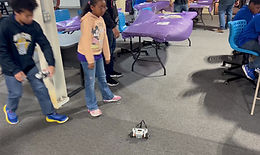How to Unlock Career Potential for Young People
- Henry Washington

- Aug 23, 2025
- 4 min read
Unlocking career potential is a crucial step for young people as they transition from education to the workforce. The early years of a career can set the foundation for future success, growth, and satisfaction. This guide offers practical advice and actionable steps to help young individuals discover and maximize their career potential.
Understanding Career Potential and Its Importance
Career potential refers to the ability to grow, develop skills, and achieve success in a chosen profession. For young people, recognizing and nurturing this potential early can lead to better job opportunities, higher earnings, and personal fulfillment.
Why is career potential important?
It helps identify strengths and areas for improvement.
It guides career choices aligned with personal interests and market demand.
It encourages continuous learning and adaptability.
It builds confidence and motivation to pursue goals.
To unlock career potential, young people need to be proactive, open to new experiences, and willing to invest time in skill development.

Steps to Unlock Career Potential for Young People
Unlocking career potential involves a combination of self-assessment, skill-building, networking, and strategic planning. Here are key steps to follow:
1. Self-Assessment and Goal Setting
Start by understanding your interests, values, and skills. Tools like personality tests, career assessments, and feedback from mentors can provide valuable insights.
Write down your short-term and long-term career goals.
Identify industries and roles that align with your passions.
Set SMART goals (Specific, Measurable, Achievable, Relevant, Time-bound).
2. Acquire Relevant Skills and Education
Skills are the currency of the job market. Focus on both hard skills (technical abilities) and soft skills (communication, teamwork).
Enroll in courses, workshops, or certifications related to your field.
Take advantage of online learning platforms.
Participate in internships or volunteer work to gain practical experience.
3. Build a Professional Network
Networking opens doors to opportunities and mentorship.
Attend industry events, job fairs, and seminars.
Join professional groups on social media platforms like LinkedIn.
Connect with alumni, professors, and professionals in your desired field.
4. Gain Real-World Experience
Experience helps you apply knowledge and build confidence.
Seek internships, part-time jobs, or freelance projects.
Volunteer for community projects or non-profits.
Document your achievements and learnings in a portfolio or resume.
5. Stay Adaptable and Open to Change
The job market evolves rapidly. Being flexible allows you to seize new opportunities.
Keep up with industry trends and emerging technologies.
Be willing to pivot or explore different roles.
Embrace lifelong learning as a career strategy.
What is the Best Career to Start at 18?
Choosing the right career at 18 can be challenging but setting a strong foundation is key. The best career depends on individual interests, skills, and market demand. Here are some promising options for young people starting out:
Technology and IT
Roles like software developer, data analyst, or cybersecurity specialist are in high demand.
Many tech jobs offer entry-level positions with opportunities for growth.
Online coding bootcamps and certifications can accelerate entry.
Healthcare
Positions such as medical assistant, pharmacy technician, or nursing aide provide stable career paths.
Healthcare offers opportunities for advancement with further education.
Skilled Trades
Electricians, plumbers, and HVAC technicians are essential and well-paid.
Apprenticeships provide hands-on training and job security.
Creative Industries
Graphic design, digital marketing, and content creation are growing fields.
Portfolios and freelance work can help build a career.
Business and Finance
Entry-level roles in sales, customer service, or accounting can lead to management positions.
Internships and certifications like CPA or CFA add value.
Choosing a career at 18 should balance passion, skills, and realistic job prospects. Exploring multiple options through internships or part-time jobs can help clarify the best path.

Leveraging Youth Career Opportunities for Growth
Young people today have access to a variety of youth career opportunities that can accelerate their professional journey. These opportunities include internships, apprenticeships, mentorship programs, and online platforms designed to connect youth with employers.
For example, participating in an internship can provide hands-on experience and industry contacts. Apprenticeships combine work and training, allowing young people to earn while they learn. Mentorship programs offer guidance and support from experienced professionals.
To make the most of these opportunities:
Research programs relevant to your career interests.
Apply early and prepare a strong resume and cover letter.
Be proactive in seeking feedback and learning from experiences.
For more information on available programs and resources, visit youth career opportunities.

Building a Personal Brand and Online Presence
In today’s digital world, a strong personal brand can set you apart from other candidates. Your personal brand reflects your skills, values, and professional identity.
How to build your personal brand:
Create a professional LinkedIn profile with a clear photo and detailed experience.
Share relevant content and engage with industry groups.
Develop a personal website or portfolio showcasing your work.
Maintain consistency in your online presence across platforms.
A well-crafted personal brand helps employers find you and understand your value. It also builds credibility and trust.
Developing Soft Skills for Career Success
While technical skills are important, soft skills often determine long-term success. Employers value qualities like communication, teamwork, problem-solving, and adaptability.
Ways to develop soft skills:
Join clubs or organizations to practice leadership and collaboration.
Take public speaking or communication courses.
Volunteer in community projects to enhance empathy and teamwork.
Seek feedback and work on areas of improvement.
Strong soft skills improve workplace relationships and open doors to leadership roles.
Planning for Continuous Career Growth
Career development is an ongoing process. To unlock your full potential, commit to continuous growth.
Set new goals regularly and track your progress.
Seek additional training and certifications.
Network with professionals and attend industry events.
Stay informed about changes in your field.
By investing in yourself, you ensure your career remains dynamic and fulfilling.
Taking the First Step Toward Your Future
Unlocking career potential is a journey that starts with a single step. Whether it’s enrolling in a course, applying for an internship, or building your network, every action counts.
Remember to stay curious, be patient, and embrace challenges as opportunities to learn. Your career potential is vast, and with the right mindset and effort, you can achieve great success.
Start today by exploring available resources and making a plan that suits your goals. The future is yours to shape.







Comments